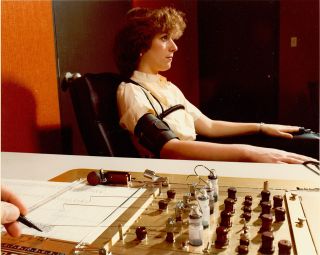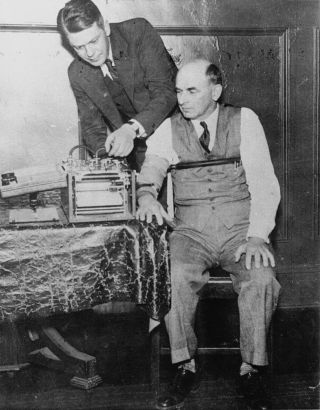Deception
Sensing Farfetched Lies
Can we tell when someone is lying?
Posted September 15, 2023 Reviewed by Tyler Woods

I’m one of those rare writers who has been inundated by coincidence stories from people I know and trust and those I don’t know and don’t trust. After writing a book on the odds of astounding happenings, I question whether there is something in the universe that messes with time and place to spark chance encounters that have no apparent causes. Could there be metaphysical connections, a oneness in this universe, hidden energy, or brain wave attraction that changes behavior? These are common questions that have no definite answers.
Things were less complicated in the 19th century, when strict classical physics viewed the laws of nature as interactions of all observable objects. In those years, futures could unfold by knowing all the present variables. But the early 20th century brought in quantum mechanics, a radical shift of viewpoint that every possible path to the future has a probability that depends on paths taken; meaning, what happened in the past only gives us uncertain probabilities of what might happen in the future.
But human decisions bring along free will that leapfrogs all quantum influences. Some of the many people I interviewed for my research on coincidences believed in brain-wave connections, others felt spiritual guidance. Through categorized testimonies, I found that dozens of my over 400 interviewees followed conspiracy theories explained through blame and timing.
Some argued that climate change Is a coincidental hoax. Several are QAnon followers. And one, Norman, seriously believed that the former Venezuelan President Hugo Chavez (who died in 2013) had manipulated the software behind Dominion voting machines to favor Joe Biden’s 2019 presidential win.
BBC Radio-4 coincidence stories
In 2016, BBC Radio-4 asked me to analyze a selection of the best reader-submitted coincidence stories. I said I would pick five of the producer’s estimation of the ten best. While interviewing all ten, I felt that half were lying and the other half were liberally exaggerating. One of the picked five came from an American whose story was so extraordinary that it heightened my suspicion of total fabrication. The other four are almost as staggering. Through repeated grilling, the ones of astonishing odds, had no support.
As a follow-up, I wrote, “Some [coincidences] are meaningful flukes that test our belief in chance... Most of these seem improbable, but when considered mathematically, they are not really so unlikely.” By definition, a coincidence is surprising and can be astounding. It can be true even if it cannot be verified. According to the laws of mathematical probability theory, any one from my coincidence story collection could be perfectly true. Yet, even I, as a mathematician, sensed the fabrications.

The Polygraph
From my understanding of fellow PT contributor Dr. Christian L. Hart's 2022 article, "A Theory of Lying and Dishonesty," people usually lie to boost their self-esteme and confidence. So, verifying coincidence stories is almost impossible without polygraph testing (which can be extremely inaccurate according to findings of the American Psychological Association) and a live interview where personal emotions can be witnessed. Confessing my bias, I treat polygraph evidence the same way I do forensic non-DNA hair analysis: with high suspicion of fact confirmation.
Short of that and body-gesture analysis, we have no way of knowing when a story is true. That said, we should know that a polygraph is just a concordance of indicators—blood pressure, pulse, respiration (oxygen transmission from surface layer cells to inner layer tissues), and electrodermal activity (skin conductance). In theory, the polygraph can differentiate truthful answers from the untruthful; however, there is no evidence-based research showing that those physiological indicators have any reasonably strong connections to the truth or falsity of answers to personal questions.
Why should I assume some storytellers make things up?
Because they do. In subsequent interviews, three people whose stories were selected by the BBC defended their stories based on “mostly true” experiences while admitting that they were “pretty much” fabricated. When I asked why they would “exaggerate” their stories, their answers hit on the notion that their personal coincidences gave them a sense of existential significance and individuality. Some said the storytelling changed in directions they could not control. Others said that they thought their stories happened, but on reflection, they “might not have.”
Again, I learned from Hart. His 2023 article, "What Are Blue Lies and Why Do People Tell Them?," explained that his research concluded "that 95 percent of people report lying in any given week." There are white lies and black lies, the self-serving ones "aimed at covering one’s misdeeds or gaining some advantage."
Could I seriously consider a story told by someone who believes a man can alter tens of thousands of voting ballots eight years after his death? Well, here is Norman’s considerably shortened version of one of his stories, still accurate for its purpose.
Norman was leaning over a taffrail on the New York to Staten Island ferry, looking for a business card in his wallet to give to a colleague he had just met. Startled by the blast of a foghorn, he fumbled his wallet overboard. More than a half-year later he received a call from a friend on Nantucket (~200 miles as a fish swims) telling Norman that his wallet was found in a fishing net.
You be the judge of Norman's truth.
References




